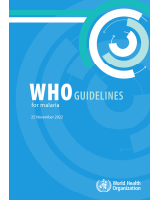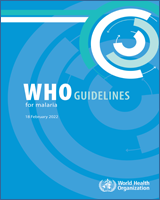The consolidated WHO Guidelines for malaria present all of the current WHO recommendations for malaria. These are the product of careful evaluation following standardized methods as part of the WHO process for developing guidelines (1). WHO uses strictly defined processes to assess the quality, consistency and completeness of evidence to determine the strength of each recommendation.
WHO malaria recommendations tend to be short, evidence-based statements. They are usually accompanied by supplementary statements which draw attention to contextual and implementation considerations that may influence the appropriateness and impact of a recommendation in different settings. Clearly distinguishing recommendations from their associated contextual considerations provides a degree of flexibility for national policymakers to adopt and adapt the strategies that are most appropriate in their settings.
This online platform and the associated PDF help to distinguish the formal recommendations from the supplementary statements. The Global Malaria Programme (GMP) will use this platform to produce “living guidelines”, which can be updated more rapidly than printed documents as new evidence becomes available. The tabs below each recommendation enable users to access the research evidence and evidence-to-decision frameworks (EtD) that informed the recommendation. There is also a feedback tab where users are encouraged to provide input directly related to each intervention. The online platform contains links to other resources including guidance and information on: strategic use of information to drive impact; surveillance, monitoring and evaluation; operational manuals, handbooks and frameworks; and a glossary of terms and definitions.
Scope
The consolidated WHO Guidelines for malaria bring together all recommendations for malaria, including prevention using vector control, preventive chemotherapy and the vaccine; diagnosis, treatment and elimination strategies. The Guidelines also provide links to other resources including guidance and information on: strategic use of information to drive impact; surveillance, monitoring and evaluation; operational manuals, handbooks and frameworks; and a glossary of terms and definitions.
The Guidelines provide:
evidence-based recommendations pertaining to vector control tools, technologies and approaches that are currently available for malaria prevention and control, and for which sufficient evidence on their efficacy is available to support systematic reviews. The Guidelines are intended to provide an underlying framework for the design of effective, evidence-based national vector control strategies and their adaptation to local disease epidemiology and vector bionomics;
evidence-based recommendations on the use of antimalarial medicines as preventive chemotherapy in people living in malaria-endemic areas who are at risk of malaria morbidity and mortality. These approaches include intermittent preventive treatment (IPT) in pregnancy (IPTp), IPT in infants (IPTi) and seasonal malaria chemoprevention (SMC);
evidence-based recommendations on the treatment of uncomplicated and severe malaria in all age groups and situations, including in young children and pregnant women; and
guidance on strategies for elimination settings (recommendations are in development).
No guidance is given on the use of antimalarial agents to prevent malaria in people travelling from non-endemic settings to areas of malaria transmission. This is available in the WHO International travel and health guidance (2).
WHO guidelines, recommendations and good practice statements
A WHO guideline is any document developed by WHO containing recommendations for clinical practice or public health practice or health policy. A recommendation informs the intended end-user what he or she can or should do in specific situations to achieve the best possible health outcomes, individually and/or collectively. It guides the choice among different interventions or measures to ensure a positive impact on health and implications for the use of resources.
In certain situations, good practice statements may be provided. These statements reflect the consensus of the Guidelines Development Group (GDG) that the benefits of adhering to the intervention or course of action are large and unequivocal, and do not need to be supported by a systematic evidence review or could be based on indirect evidence.
The primary purpose of these WHO Guidelines is to support policy-makers in ministries of health and the managers of national malaria control programmes in endemic countries to establish national policies and plans tailored to their local context.
Link to WHO prequalification
When a recommendation is linked to the introduction of a new tool or product, there is a parallel process managed by the WHO Prequalification Team to ensure that diagnostics, medicines, vaccines and vector control products meet global standards of quality, safety and efficacy, in order to optimize use of health resources and improve health outcomes. The prequalification process consists of a transparent, scientifically sound assessment, including dossier review, consistency testing or performance evaluation and site visits to manufacturers. This information, in conjunction with other procurement criteria, is used by the United Nations (UN) and other procurement agencies to make purchasing decisions regarding these health products. This parallel process aims to ensure that recommendations are linked to prequalified products and that prequalified products are linked to a recommendation for use.
Updating evidence-based guidance
The first edition of these consolidated Guidelines was published in February 2021 as a compilation of the existing recommendations for malaria vector control and treatment.
This current update includes the first ever WHO recommendation on a malaria vaccine. This was based on a full evidence review of the RTS,S/AS01 malaria vaccine and advice from the Malaria Policy Advisory Group (MPAG) and the Strategic Group of Experts (SAGE) on Immunization following a joint session on 6 October 2021.
Areas currently under review for chemotherapy include recommendations already in the Guidelines for which the evidence was previously not subjected to the GRADE process, along with updates on the use of antimalarial medicines in special risk populations including pregnant women. These updates will be presented to the GRC as they become available in 2022.
Readers should note the dates of individual recommendations. Revisions to this guidance will be communicated via the GMP website and through WHO’s standard dissemination channels. These consolidated Guidelines represent the latest and definitive reference for all WHO guidance on malaria.
Dissemination
These consolidated WHO Guidelines for malaria are available on the MAGICapp online platform, linked to the WHO malaria website. The original English version has been translated into French and will be translated into two additional languages (Spanish and Arabic). All research evidence and references are available on the web platform and will be available to download, and relevant implementation guidance will be linked to the recommendations. When recommendations are updated, they will be labelled as such and will always display the date of the most recent update. Each time there is an update, an updated PDF version of the Guidelines will be downloadable on the WHO GMP website to facilitate access where the Internet is not reliably available. Users should note that older downloaded PDFs of the Guidelines may be outdated and may not contain the latest recommendations.
WHO Headquarters will work closely with its regional and country offices to ensure the wide dissemination of the Guidelines to all malaria endemic countries. There will also be dissemination through regional, sub-regional and country meetings. Member States will be supported to adapt and implement these Guidelines.
Feedback
GMP welcomes feedback, either via the tab associated with each recommendation or by e-mail to tni.ohw@kcabdeefpmg, to help identify recommendations in need of update or development.


